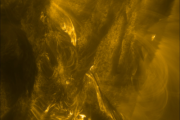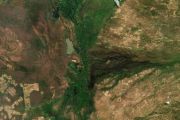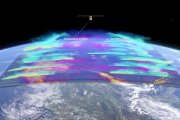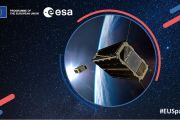
Copernical Team
'Potential biosignatures' found in ancient Mars lake
 Led by NASA and featuring key analysis from Imperial College London, the work has uncovered a range of minerals and organic matter in Martian rocks that point to an ancient history of habitable conditions and potential biological processes on the Red Planet.
Led by NASA and featuring key analysis from Imperial College London, the work has uncovered a range of minerals and organic matter in Martian rocks that point to an ancient history of habitable conditions and potential biological processes on the Red Planet. Perseverance Meets the Megabreccia
 Last week, the Perseverance rover began an exciting new journey. Driving northwest of the Soroya ridge, Perseverance entered an area filled with a diverse range of boulders that the science team believes could hold clues to Mars' early history.
The terrain we are exploring is known as megabreccia: a chaotic mixture of broken rock fragments likely produced during ancient asteroid impacts. S
Last week, the Perseverance rover began an exciting new journey. Driving northwest of the Soroya ridge, Perseverance entered an area filled with a diverse range of boulders that the science team believes could hold clues to Mars' early history.
The terrain we are exploring is known as megabreccia: a chaotic mixture of broken rock fragments likely produced during ancient asteroid impacts. S NASA Uses Colorado Mountains for Simulated Artemis Moon Landing Course
 NASA has certified a new lander flight training course using helicopters, marking a key milestone in crew training for Artemis missions to the Moon. Through Artemis, NASA explore the lunar South Pole, paving the way for human exploration farther into the solar system, including Mars.
The mountains in northern Colorado offer similar visual illusions and flight environments to the Moon. NASA
NASA has certified a new lander flight training course using helicopters, marking a key milestone in crew training for Artemis missions to the Moon. Through Artemis, NASA explore the lunar South Pole, paving the way for human exploration farther into the solar system, including Mars.
The mountains in northern Colorado offer similar visual illusions and flight environments to the Moon. NASA Finding safe impact zones to deflect hazardous asteroids
 Selecting the point of impact for a kinetic deflection mission is not trivial, according to research unveiled at the EPSC-DPS2025 Joint Meeting in Helsinki. Striking the wrong location could nudge a hazardous asteroid through a gravitational keyhole and set up a future Earth encounter.
"Even if we intentionally push an asteroid away from Earth with a space mission, we must make sure it doe
Selecting the point of impact for a kinetic deflection mission is not trivial, according to research unveiled at the EPSC-DPS2025 Joint Meeting in Helsinki. Striking the wrong location could nudge a hazardous asteroid through a gravitational keyhole and set up a future Earth encounter.
"Even if we intentionally push an asteroid away from Earth with a space mission, we must make sure it doe Clues to ancient Martian chemistry revealed by Perseverance rover
 NASA's Perseverance rover has uncovered evidence of long-ago chemical processes while exploring Jezero Crater, giving scientists fresh insight into how minerals, water, and possibly organics interacted billions of years ago. A new Nature News and Views article by SETI Institute Senior Research Scientist Janice Bishop and University of Massachusetts Professor Mario Parente highlights these discov
NASA's Perseverance rover has uncovered evidence of long-ago chemical processes while exploring Jezero Crater, giving scientists fresh insight into how minerals, water, and possibly organics interacted billions of years ago. A new Nature News and Views article by SETI Institute Senior Research Scientist Janice Bishop and University of Massachusetts Professor Mario Parente highlights these discov Chinese astronauts expand science research on orbiting space station
 Shenzhou 20 astronauts - Chen Dong, Chen Zhongrui and Wang Jie - are pushing forward with wide-ranging scientific experiments and technology tests aboard China's space station, advancing knowledge across multiple research domains.
In space medicine, the crew used electroencephalogram equipment for experiments including visual field studies, executive-function training and exploratory utili
Shenzhou 20 astronauts - Chen Dong, Chen Zhongrui and Wang Jie - are pushing forward with wide-ranging scientific experiments and technology tests aboard China's space station, advancing knowledge across multiple research domains.
In space medicine, the crew used electroencephalogram equipment for experiments including visual field studies, executive-function training and exploratory utili Exolaunch to deliver 59 satellites on record Transporter-15 mission
 Exolaunch will deploy 59 satellites on the upcoming Transporter-15 rideshare flight with SpaceX, scheduled no earlier than November 2025. The mission, Exolaunch's largest to date, spans more than 30 customers across 16 countries, underscoring the company's role as a premier launch services provider with a proven record of reliability.
Transporter-15 highlights Exolaunch's expanding market
Exolaunch will deploy 59 satellites on the upcoming Transporter-15 rideshare flight with SpaceX, scheduled no earlier than November 2025. The mission, Exolaunch's largest to date, spans more than 30 customers across 16 countries, underscoring the company's role as a premier launch services provider with a proven record of reliability.
Transporter-15 highlights Exolaunch's expanding market Surviving hostile Venus conditions with new alloy and sensor technologies
 Whether building alloys that can power rovers on Venus or devising portable sensors to detect rare earths on Earth, University of Pittsburgh researcher Paul Ohodnicki is advancing materials science for critical frontiers. His team has earned two 2025 R and D 100 Awards for VulcanAlloy and eMission Critical Sensor technologies.
The annual awards honor innovation with practical impact across
Whether building alloys that can power rovers on Venus or devising portable sensors to detect rare earths on Earth, University of Pittsburgh researcher Paul Ohodnicki is advancing materials science for critical frontiers. His team has earned two 2025 R and D 100 Awards for VulcanAlloy and eMission Critical Sensor technologies.
The annual awards honor innovation with practical impact across Black hole explosion may soon reveal origins of matter in the universe
 Physicists at the University of Massachusetts Amherst report a more than 90% probability that astronomers could witness an exploding black hole within the next decade. If observed, the event would provide unprecedented insight into the foundations of physics and the origins of the universe.
Such an explosion would strongly suggest the existence of primordial black holes (PBHs), theoretical
Physicists at the University of Massachusetts Amherst report a more than 90% probability that astronomers could witness an exploding black hole within the next decade. If observed, the event would provide unprecedented insight into the foundations of physics and the origins of the universe.
Such an explosion would strongly suggest the existence of primordial black holes (PBHs), theoretical NASA blocks Chinese citizens from working on space programs
 NASA has begun barring Chinese nationals with valid visas from joining its programs, underscoring the intensifying space race between the rival powers.
The policy shift was first reported by Bloomberg News and confirmed by the US government agency.
"NASA has taken internal action pertaining to Chinese nationals, including restricting physical and cybersecurity access to our facilities, m
NASA has begun barring Chinese nationals with valid visas from joining its programs, underscoring the intensifying space race between the rival powers.
The policy shift was first reported by Bloomberg News and confirmed by the US government agency.
"NASA has taken internal action pertaining to Chinese nationals, including restricting physical and cybersecurity access to our facilities, m 



























